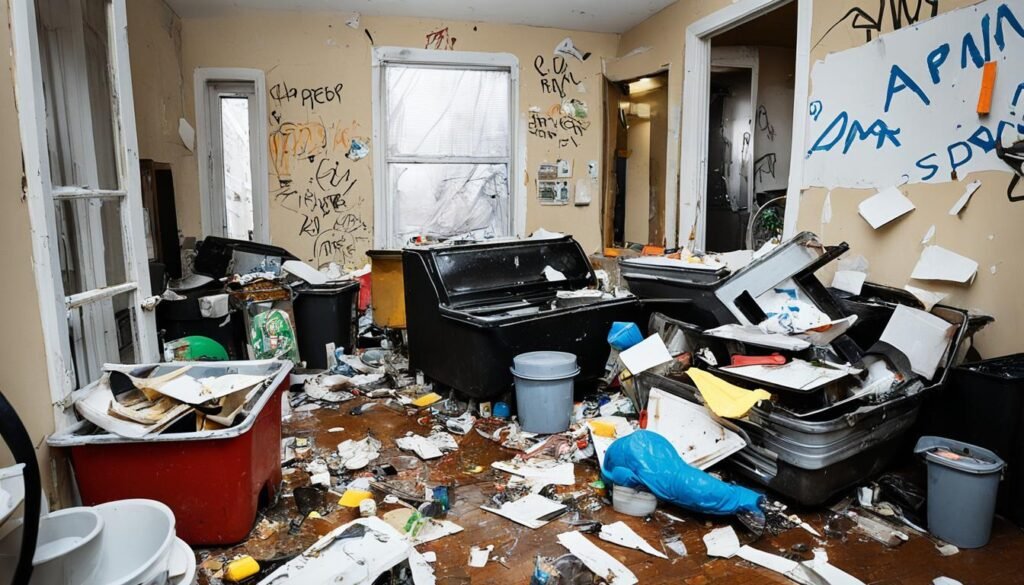Antisocial behaviour from tenants can include noise, property damage, and even illegal activities. It’s a big reason landlords might need to ask tenants to leave. This guide will help landlords deal with such behaviour. It covers legal rights, ways to prevent issues, and how to solve problems.
Key Takeaways
- Landlords should check tenant references before letting a property, not just credit scores.
- Make sure tenancy agreements have clauses that make tenants responsible for any bad behaviour.
- Working with the police is key when dealing with ongoing bad behaviour.
- Think about adding clauses to the tenancy agreement that let you end it early if needed.
- Talk to new tenants about what’s expected of them to prevent problems.
What Constitutes Antisocial Behaviour
The Housing Act 2004 defines antisocial behaviour (ASB) as actions by people living or visiting homes that disturb others nearby. It also includes actions that could lead to illegal use of the property. Common examples of such behaviour include:
- Violence or threats of violence
- Harassment and hate crimes
- Verbal abuse
- Environmental damage, such as graffiti or vandalism
- Unreasonable and persistent noise
- Drug or alcohol use causing distress
- Activities related to prostitution
Activities Not Considered Antisocial
Not all noise or disruptions are seen as antisocial behaviour. Sounds from children playing or a baby crying are normal. So are everyday noises like flushing toilets or closing doors. These sounds are part of living in a home and should be accepted by neighbours.
| Examples of Antisocial Tenant Behaviour | Activities Not Considered Antisocial |
|---|---|
|
|

Landlord’s Responsibilities
Landlords have a key role in dealing with antisocial behaviour from their tenants. They must take steps to stop, spot, and manage these issues in their properties. This duty is for all landlords, no matter the tenancy type.
For landlords with Houses in Multiple Occupation (HMOs), there are extra rules. The Management of Houses in Multiple Occupation (England) Regulations 2006 say landlords must keep common areas clean and provide proper waste bins. Not following these HMO rules can lead to fines or even criminal charges.
Licence Conditions for Landlords
Landlords of licensed properties must follow certain licence rules. These rules include dealing with noise complaints, like loud music or washing machines at night. They should make fair and reasonable decisions on these matters.
If landlords don’t meet their duties or follow licence rules, they could face action. This might be fines or even criminal charges from the local authority.
| Key Landlord Responsibilities | Potential Consequences of Non-Compliance |
|---|---|
| Comply with HMO regulations | Civil penalties or criminal prosecution |
| Adhere to licence conditions related to antisocial behaviour | Enforcement action by local authorities |
| Take reasonable steps to prevent, identify, and manage antisocial behaviour | Legal action and potential loss of licence |

Preventing Antisocial Behaviour
Stopping antisocial tenant behaviour is best done by being proactive. Landlords can take steps to lower the chance of such problems. This means acting early to prevent issues.
Pre-Tenancy Checks
Doing detailed pre-tenancy checks helps. Ask for references that cover antisocial behaviour. This way, landlords can spot potential problems early. It’s key to check who you’re letting in to avoid antisocial behaviour later.
Providing Contact Information
Give neighbours your contact details and those of your managing agent and out-of-hours support. This lets neighbours report any behaviour issues fast. The landlord can then quickly sort out the problem.
Pre-Tenancy Meetings and Information
Meet with the tenant before they start living there. Explain your obligations and the need to respect neighbours. If the tenant doesn’t speak English well, have an interpreter there to make sure they understand.
Addressing Parking and Vehicle Storage
Explain parking arrangements like spaces, garages, and parking restrictions or residents parking schemes. This sets clear rules for where and how to park and store vehicles.
Managing Refuse and Recycling
Make sure there are good refuse and recycling facilities and tell tenants when bins are collected. This keeps the place clean and stops fly-tipping. Tell tenants not to leave items outside the property.
Landlord’s guide to dealing with antisocial behaviour from tenants
As a landlord, it’s your job to handle antisocial behaviour from tenants. If tenants disturb neighbours or other people living in the property, you must act. For landlords with a licence, you must take steps to stop or lessen this behaviour.
If you don’t deal with this behaviour, you could lose your licence and face fines or even prosecution. It’s key to act quickly to keep the living area peaceful, protect your property, and meet the law.
Responding to Complaints
When someone reports antisocial behaviour, you should act fast. Here’s what to do:
- Verbal Warnings: Talk to the tenant directly. Tell them to stop the behaviour right away.
- Written Warnings: Then, give them a formal warning. Include details of the complaint and what will happen if they don’t stop.
- Cautions: If they don’t listen, warn them again. Say that legal action could follow if they don’t change.
- Gathering Evidence: Keep records of all warnings and complaints. Also, collect any evidence like witness statements or photos. This will help if you need to go to court.
Breach of Tenancy
If the behaviour is really bad or keeps happening, you might need to evict the tenant. You can use a Section 8 notice for serious breaches or nuisance. This notice has specific reasons like breaking the tenancy agreement or being a nuisance.
Or, you might use a Section 21 ‘no-fault’ eviction notice. But, this could change with new laws. Keep good records and evidence for court if needed.
Being proactive and keeping detailed records helps landlords deal with antisocial behaviour. This way, you can solve problems, protect your property, and meet your legal duties. Acting early and keeping records well can really help you in the end.
Identifying Antisocial Behaviour
As a landlord, it’s key to spot signs of antisocial behaviour early. This means doing regular checks on your property, listening to neighbour complaints, and working with the council and police.
Regular Property Inspections
Regular visits to your rental can show signs of antisocial behaviour. Look for things like a property that doesn’t look well cared for, lots of visitors, or signs of drug use. These clues can tell you about the tenant’s behaviour and let you deal with problems fast.
Complaints and Reports to the Council
Neighbours often see the worst of antisocial behaviour first. If the council gets complaints about noise or other issues, you must work with council officers. They have ways to deal with this behaviour and might take action against landlords who don’t follow the rules.
Complaints and Reports to the Police
If the behaviour is criminal, like vandalism or aggressive acts, tell the police. Working with the police can help fix the problem and keep your tenants and the area safe.
| Type of Antisocial Behaviour | Reporting Channel |
|---|---|
| Noise, nuisance, or disturbances | Report to the local council |
| Criminal activities, including vandalism, violence, or drug-related issues | Report to the police |
Responding to Complaints
When a landlord gets a complaint about a tenant, they should gather lots of information first. This might mean talking to those affected or working with officers who investigate. Then, the landlord should talk to the tenant early, explaining the problems caused by their actions. They must warn the tenant that more issues could lead to eviction. Keeping a record of all talks helps keep things balanced.
Verbal Warnings
If the tenant doesn’t change after a verbal warning, the landlord might send a formal written warning. This should clearly state the rules broken, how they were broken, what to do next, and the next steps if they don’t improve. Keeping copies of all letters sent is important to document the process.
Written Warnings
A caution is a formal warning but not a legal document. It should list the tenant’s past verbal warnings and the incidents that caused the problem. Cautions are used when a warning letter didn’t work but the issue isn’t serious enough for a notice.
Gathering Evidence
Even at the start, landlords should keep records of complaints and facts about the tenant’s bad behaviour. This is useful if legal action is needed later. It’s good to follow up talks or attempts to document correspondence with the tenant with written notes. This creates a clear record of efforts to solve the problems.
| Action | Purpose | Key Considerations |
|---|---|---|
| Verbal Warnings | To address the issue at an early stage and provide the tenant with an opportunity to rectify their behaviour. | Maintain a record of all conversations and ensure a balanced approach. |
| Written Warnings | To formally document the breach of tenancy conditions and the consequences if the behaviour continues. | Provide clear details of the issues and the required action, and maintain copies of all correspondence. |
| Cautions | To issue a more formal warning about a breach of tenancy conditions, without resorting to legal action. | List the previous warnings and the specific incidents that have led to the breach, in cases where a warning letter has not been effective. |
| Gathering Evidence | To build a strong case for potential legal action if the tenant’s behaviour does not improve. | Maintain detailed records of complaints, factual information about the behaviour, and documentation of attempts to resolve the issues. |
Alternative Approaches
Before thinking about legal steps to end a tenancy, landlords can look into other ways to solve problems. One good option is using Neighbourhood Justice Panels. These panels help neighbours find solutions they both agree on.
Landlords can also connect tenants with support services if the tenant is struggling with their home. This support can make things better for both the tenant and the landlord. It helps the tenant deal with their issues and live better.
Mediation and Support Services
Mediation can be a great way to fix issues between tenants and landlords. It helps both sides talk openly and find a solution they’re happy with. By tackling the real reasons behind the bad behaviour, mediation might stop the need for legal action. It can also keep the landlord-tenant relationship positive.
Support services, like help with mental health, money, or social issues, can also help. They connect tenants with the right resources. This way, landlords can help their tenants get better and avoid more problems in the future.
| Approach | Benefits |
|---|---|
| Neighbourhood Justice Panels | Provide a platform for neighbours to work out mutually acceptable solutions |
| Support Services | Address underlying issues, improve tenant living situation, and reduce future conflicts |
| Mediation Services | Facilitate open communication and find mutually satisfactory solutions |
By trying these alternative methods, landlords can often solve problems without legal action. They can offer mediation services, give support for tenants, resolve conflicts, and address underlying issues in a better way.
Legal Actions and Eviction
If a tenant’s behaviour is a problem and doesn’t improve, the landlord might need to take legal steps. This could mean ending the tenancy. Tenancy agreements often have a clause about not causing a nuisance to neighbours. If the tenant keeps breaking this rule and doesn’t change after warnings, the landlord can end the tenancy.
In some areas, landlords must take steps to stop or reduce antisocial behaviour. If they don’t, they could lose their license, face prosecution, or get fined. It’s important for landlords to make sure tenants know what’s expected of them, including not causing trouble and taking care of their rubbish.
Dealing with antisocial behaviour, landlords can use warnings, both spoken and written, and even cautions before taking legal steps. It’s a good idea to keep records of complaints and evidence of the tenant’s actions. Using services like Neighbourhood Justice Panels can also help solve neighbour disputes.
| Key Statistics | Percentage |
|---|---|
| One in three tenancies in the private sector were ended by landlords due to a tenant’s antisocial behaviour. | 33% |
| Up to one million households were affected by antisocial behaviour in the social housing sector in 2022. | N/A |
| Fifty-five percent of social housing tenants who reported a problem were unhappy with the outcome. | 55% |
| Forty percent of tenants didn’t report antisocial behaviour issues because they didn’t believe their landlord would take action. | 40% |
In 2022, a landlord in London had to pay £150,000 to fix their property because of illegal cannabis farms in their rental homes. The government wants to make it easier to evict tenants for antisocial behaviour in the private sector. They also plan new rules for social housing in January 2024, including a “3 strikes and you’re out” rule for bad behaviour.
Eviction should be a last choice, but landlords must act if tenants keep causing trouble. Knowing the legal steps and following them helps protect the property and keeps the rental area positive. It also ensures the wellbeing of all tenants.
Conclusion
This guide has given landlords a clear look at how to handle antisocial behaviour from tenants. It covers the different types of bad behaviour, the legal duties landlords have, and how to stop problems before they start. This way, landlords can deal with issues and lessen their effect on the community.
By acting early, talking clearly with tenants, and taking legal steps when needed, landlords can keep their properties in order. The UK’s private rented sector has 4.5 million homes, making up about 19% of all housing. So, it’s crucial to have good ways to deal with antisocial behaviour.
This guide highlights the need for thorough checks before letting out a property, clear communication with tenants, and quick action on problems. By being alert, talking well, and using the law, landlords can handle antisocial behaviour. This helps keep their rental properties in good standing and their reputation high.




